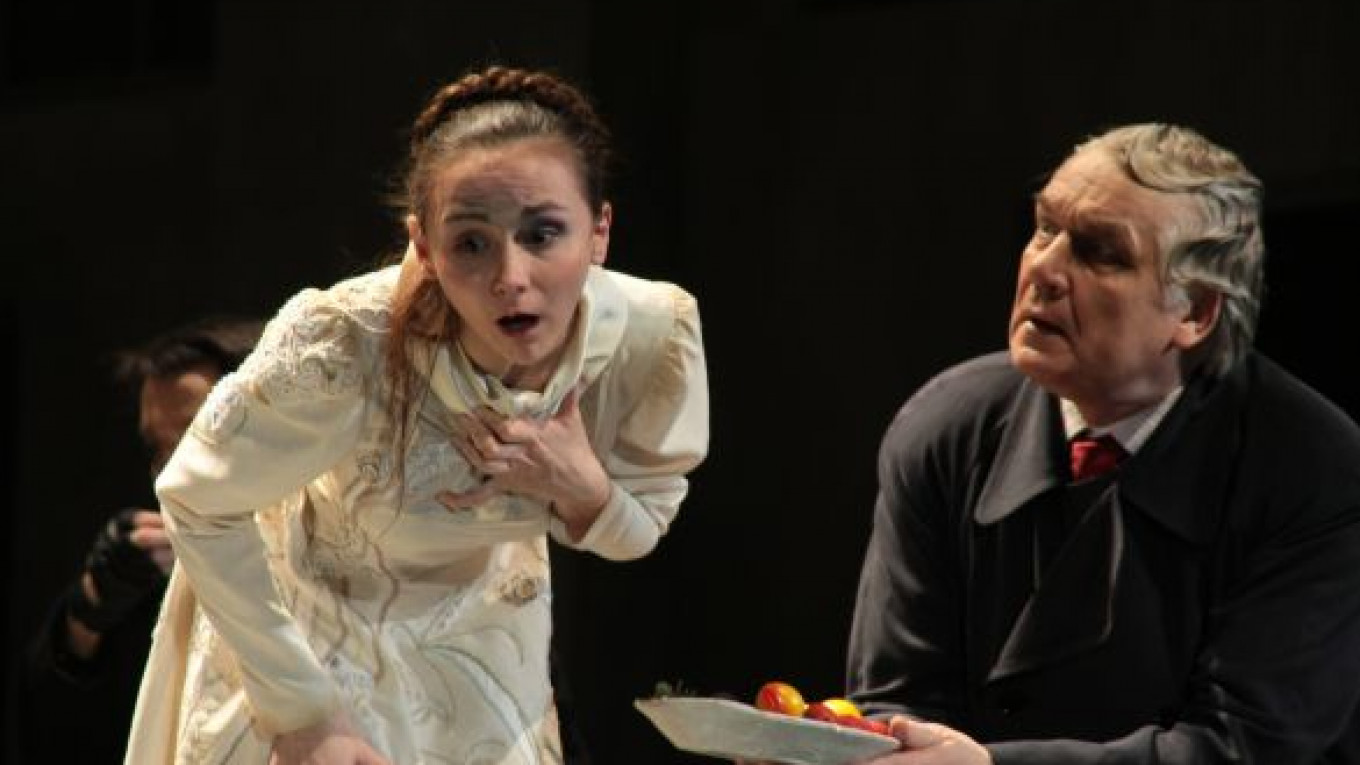Witold Gombrowicz wrote “Iwona, Princess of Burgundy” in 1935. It tells the tale of a strange and mysterious female who throws a royal family into confusion and nearly destroys it, before she is “removed” herself.
Like most of the Polish author’s other works, “Iwona” only gained recognition in the 1960s. From time to time, it enjoys resurgences of interest.
Five years ago, three productions of “Iwona” were mounted in Moscow. An opera was created from the play by Philippe Boesmans at the Paris Opera in 2009. And now a major theatrical production has been staged by Vladimir Mirzoyev at the Vakhtangov Theater under the altered title of “Princess Iwona.”
Mirzoyev has a reputation for being one of Moscow’s most unorthodox directors. He has a way of mixing Eastern philosophy with the notions of Sigmund Freud in theatrical packages that are visually bracing and packed with unexpected action.
In this sense, Gombrowicz and Mirzoyev make an ideal pair. Gombrowicz created works that were absurd in content and oddly systematic in their philosophy, where the rational was dashed against the irrational.
But God bless Mirzoyev, he is always ready to deliver what we least expect. In this production of the eccentric Gombrowicz, Mirzoyev created one of the most unadorned shows I have ever seen him do.
It makes for a powerful combination.
Let’s begin with Alla Kozhenkova’s set, for it literally towers over everything else.
Two huge, high walls stand as a wedge, meeting at a point at the back of the stage. One wall consists primarily of grungy, opaque windows. The other is a cement monolith with doorways cut into it. The color scheme is oppressive gray. The overall sensation is just plain oppressive.
If fascism can be expressed in walls, this is how it would be done.
The action begins with a typical Mirzoyev moment. More or less in unison, the entire cast engages in what appear to be Tai Chi exercises — breathing, stretching, focusing their energy.
But once the story gets underway, Mirzoyev is intent on sticking closely to it.
Prince Filipp (Dmitry Solomykin) is a typical youth spoiled by power and money, but not lacking in intelligence and even some insight into the ways of the world.
Around him are the sycophants one expects to see at a court that is on the verge of collapsing under the weight of corruption, stupidity and sin.
As often happens, it is the sycophants — Kirill (Artur Ivanov), Kiprian (Vasily Simonov) and Iza (Vasilisa Sukhanova) — who set fateful events into motion.
When they see the clumsy, vulnerable Iwona on a walk with her aunts, they decide to have their fun by teasing and ridiculing her. Filipp resolves to outdo them all. He will marry this pathetic waif.
Filipp’s parents, King Ignacy (Leonid Gromov) and Queen Margarita (Marina Yesipenko) are horrified, although they do their best to see in their son’s rash decision a moral act that would paint him and them in the best possible light.
In fact, the presence of the innocent girl is a living reproach to everything the royals stand for. Little by little, everyone, including the shifty though loyal Chamberlain (Yury Shlykov), comes to believe that his or her survival can be guaranteed only by the death of the placid, loving Iwona.
Mirzoyev created a moving and damning portrait of how innocence and vulnerability are doomed to be suffocated by the world’s age-old systems of power.
This is no mere matter of good vs. evil.
Yesipenko’s queen is a warm, sensitive woman who writes poetry in private moments. As the king, Gromov plays an almost jolly, witty man who, in rare bad moments, may become a monster, but who rarely is that unless pushed by fate.
As Prince Filipp, Solomykin plays a perceptive and intelligent young man, who is even capable of self-doubt and self-censure. Arguably, he emerges as the closest to an evil figure in this production, since it appears to be in his powers to change things.
His failure to do so is a failure of grandiose proportions.
Maria Berdinskikh is brilliant as Iwona. She barely speaks more than a dozen words throughout the whole show, but her every gesture and glance speak volumes about innocence, love, vulnerability and good.
Since she is virtually silent — and this, of course, is Gombrowicz’s point — she can stand for anything at all. Does she represent honesty? decency? sincerity? truth? freedom?
You name it, she represents it. And whatever it is, this powerful and bitter production suggests, it is doomed.
“Princess Iwona” (Printsessa Ivonna) plays Feb. 3, 12, March 2 and 12 at 7 p.m. at the Vakhtangov Theater, located at 26 Arbat. Metro Smolenskaya, Arbatskaya. Tel. 241-1679. Running time: 3 hours.
A Message from The Moscow Times:
Dear readers,
We are facing unprecedented challenges. Russia's Prosecutor General's Office has designated The Moscow Times as an "undesirable" organization, criminalizing our work and putting our staff at risk of prosecution. This follows our earlier unjust labeling as a "foreign agent."
These actions are direct attempts to silence independent journalism in Russia. The authorities claim our work "discredits the decisions of the Russian leadership." We see things differently: we strive to provide accurate, unbiased reporting on Russia.
We, the journalists of The Moscow Times, refuse to be silenced. But to continue our work, we need your help.
Your support, no matter how small, makes a world of difference. If you can, please support us monthly starting from just $2. It's quick to set up, and every contribution makes a significant impact.
By supporting The Moscow Times, you're defending open, independent journalism in the face of repression. Thank you for standing with us.
Remind me later.







